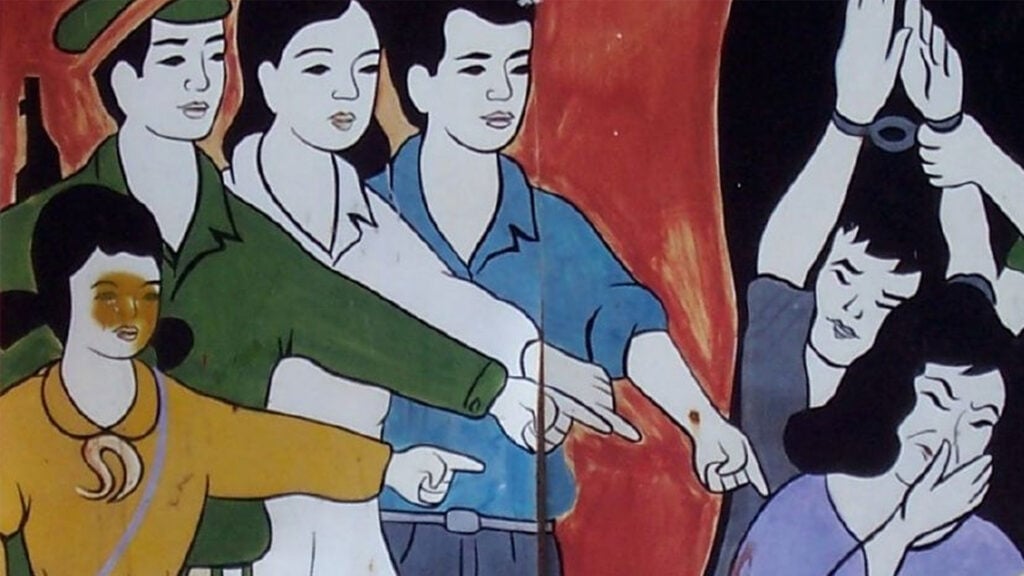The shame game. We’ve all been guilty of it: someone (a partner, or maybe just a friend) decides to bring up their personal sex fantasies. Maybe our news feed fills us in on the latest celebrity kink scandal. Regardless of where we got the juicy gossip, our collective first reaction is a big ole judgment. Sometimes, that negative reaction bubbles over; we set our coffee down, wrinkle our noses, and saying something like, “Ew, you’re into that?”
It happens. In this culture where we’re taught there’s only one right way to get sexy, it’s no surprise that people react so strongly to anything outside the norm. As much as I’d like to pretend I’ve always been inclusive, I was guilty too.
About eight or nine years ago, I was in a class on human sexuality and it was my whole world. Always curious about sex and relationships, I was sure the queen of sex positivity. At twenty, my head had more than a little hot air in it, and I thought I knew everything there was to know about embracing diverse sexualities. So when my professor tasked us all with writing an essay on a kink we didn’t “get,” I was stumped. In hindsight, I was so young and cocky it’s *almost* funny. It took a good week for my big blindspot to finally occur to me: furries. The butt of every joke on the internet at the time. The one group I had never thought to be empathetic towards.
Eager to get an A, and even more eager to prove to myself that I wasn’t as totally heartless as I feared, I started researching. And the more I read, the more it dawned on me: I’d been on some high horse without knowing these people at all. There wasn’t any way around it – I’d been a closed-minded jerk.
Before I knew that a word existed for it, I realized I’d been kinkshaming.
More than just a meme that’s been kicked around the internet for awhile, kinkshaming is a legitimate phenomenon in our culture. It’s exactly what it sounds like: giving others a hard time and making them feel bad for something consensual that they get off on. Most of the time, it’s a straightlaced, “vanilla” culture versus the rest of us sort of deal.

Generally, the less common a kink or act is, the more quickly our culture seizes on it and the kinkshaming begins. There are all kinds of things that mainstream thinking loves to give grief for, the most (un)popular tending to be scat play, watersports, and furries. But it’s not just limited to those. Anal, breath play, anything involving transactional sexuality (like hiring escorts, working a cam, or buying panties), and wearing certain outfits like latex, drag, or leather, are all things that regularly are met with shame and degradation.
It’s not just that you’re hurting someone’s feelings. There’s a lot wrong with kinkshaming, and we’ll get into more of it later, but at a bare minimum, kinshaming silences meaningful dialogue, especially between couples. It’s pretty standard for one person in a relationship to suggest something new that their partner just isn’t feeling.
Where it becomes a problem is how they respond. Instead of just saying, “That’s not my thing,” people often stifle their partners with guilt and judgment. When that happens, your partner isn’t likely to open up with any new ideas anytime soon, and communication suffers as a whole.
Our culture has always loved to judge people for getting sexy.
Before there was kinkshaming, we were scandalized by just about anything. In the nineteenth century, a married couple went to trial just for publishing a book on sex. In the 1950s, we were all about queershaming – just look at Rock Hudson’s secret life.
As a culture, we’re still wrapped up in slutshaming, and the end to LGBTQ shaming is far off. But kinkshaming has more recently come into the public eye as the internet teaches us more and more about kinks than we collectively knew before. Just look at the recent hubbub around the unnamed megacelebrity celebrity who regularly saw a dominatrix.
By and large, our society’s biggest kinkshaming scandals have been with watersports. Look at recent case with R. Kelly. The talk of the town wasn’t rape – it was watersports. And again, when rumors of Trump and the whole #goldenshowergate came out, our issue wasn’t national security or blackmail. It was pee. Seriously, people are still posting with that hashtag on Twitter.
According to sex-positive relationship counselor Alex Sanderson-Shortt, shaming anything that deviates from the norm is just creating a barrier to your happiness and the happiness of others. He puts it best when he says “we live in a complicated world when it comes to sex.” All around us, a hyper-focused, super-specific idea of want and desire is pushed on us from childhood in movies, shows, advertisements, magazines, and commercials.

Even in this increasingly diverse world, there’s still one side of sexuality presented. Because of this, Sanderson-Shortt says, “our sexualities, bodies, and relationships, are examined, commented on, and judged.” We’re told from a very young age exactly what sex should look like, who our partners had better be, and what we’re allowed to enjoy.
When we’re constantly told to not question what we want, it can be stressful to watch someone else be brave enough to shrug off those expectations.
Dr. Karen Blair from Psychology Today shed some light on the way cisgender people perceive gender nonconforming and trans* bodies. Some cisgender folks feel (wrongfully) threatened by trans* people simply because their existence is proof that what the cisgender person grew up learning isn’t true. It makes these people feel like their identity isn’t as solid or defined as they believed.
The same could be said of people who kinkshame.
When something is new and challenges previous beliefs about sex, pleasure, and identity, some people can feel like their entire foundation is shaky, and that everything they’ve understood about pleasure is up for questioning. They’re not exactly wrong.
While for some of us (myself included) challenges to our way of thinking are seen as a great opportunity to learn (and ultimately, to have better sex), for others, it can feel like reality is falling apart. If that sounds like you, there’s no easy way to slice it: the time has come for you to open up and accept other people for who the are. People have different definitions of desire, and no matter what you’re into, kink is here to stay.
This doesn’t mean you have to overhaul your own sexuality (although you’re totally encouraged to). Nobody is forcing you to suddenly invest in a latex bodysuit or a collar and leash.
Instead, all you have to do is just accept that others do things differently. We don’t all like the same food, for example, but we don’t go around shaming people for eating wheat bread instead of rye. Same thing for someone who loves mysteries, when you can’t live without sci-fi.
It’s totally natural for us all to have diverse interests, and what someone likes is really none of your business. That couldn’t be more true than in the bedroom. What someone does to invoke pleasure as as diverse as everything under the sun, and there’s no one forcing you to be into it, too.
After all, someone’s extensive karaoke habit shouldn’t make you decide to stop hanging out with someone, right? Private sex lives are no exception. If something isn’t your thing, just move on.
I’m not pushing against kinkshaming just because it’s rude. This negative attitude towards other people’s private lives can have some serious consequences in their lives. In fact, the backlash can be so hard that many people in kink communities equate it to coming out.

Although not everyone agrees with this idea, as someone who’s had to navigate disclosing both sexuality and polyamory when appropriate, I know those were both super treacherous – and I imagine going public with kink is just as difficult.When a kink like rope or BDSM culture plays a big part in our lives, hiding it can be difficult and emotionally draining. Kink often plays a seismic role in friendships people make and the relationships they build.
Having to dance around where you’re going for the weekend, where that extra money came from (or went), or how you met your current partner(s) can be difficult. Nobody likes to lie, and hiding your truest self from friends and family is isolating. But being “out” has consequences in our kinkshaming world.
It’s a surprisingly common case for people to lose their jobs or even custody of their children when their kink is outed to the public. Embracing judgmental attitudes about kink is what makes it acceptable for judges and bosses to continue making these kinds of life-shattering decisions.
Kinkshaming even bleeds into health care. In mental health fields, it’s called “kinkphobia” when a therapist is totally unwilling to talk about kinks and desires that aren’t “the norm.”
This only further isolates people, making both individual and couples therapy hard for kinky people. If a person is having a standard relationship problem, depression, or anxiety, and kink plays a large role in their lives, they can’t always be totally honest with their therapists. If they do, they can risk being shamed by them, being judged, and halting any progress they may have made. When the DSM, the (imperfect) bible of mental health diagnoses straight up says that kink isn’t a mental health disorder or pathology to treat, it isn’t really about a therapist’s care for their patients. It’s about therapists being grossed out by their patients lives.
Remember when we were talking about R. Kelly and Donald Trump’s watersports allegations? The harm in kinkshaming runs much, much deeper there. When we’re so focused on the act itself, we’re ignoring the whole legal part of the argument as well.
Putting Trump aside, R. Kelly raped multiple girls, one as young as fourteen – and we all knew about it for years. The people’s biggest concern? That there was pee involved. In fact, growing up, I heard more people blame the girl for letting something that “out there” happen to her in the first place. If we’d not kinkshamed so much, these allegations may have come to a head faster. Instead, we were so concerned with the sensational story and making people feel guilty for watersports that we overlooked a very real crime.
When you google “furry meme,” you’ll see that kinkshaming is more dangerous than just being made fun of. Many memes are harmless and made by the furry community themselves, but often there are “memes” straight up calling for people to hunt furries. It’s easy to find ones about sneaking guns into furry conventions, and how a SWAT team wouldn’t bother helping. People’s furry social media is often peppered with death threats. Kinkshaming can be taken to an extreme level, and normalizing shame in daily conversation helps violent extremists believe they’re in the right.
When someone tells you about a kink they’re into, reserve judgment. Tell them you’re happy they’ve found something they’re into. If they want you to, ask questions about their community and their friends. You don’t have to dive into their next latex party if that’s not your thing, or suddenly head out and watch tutorials on bondage rope play – unless deep down you find you’re interested, of course.

When someone trusts you enough to divulge their kink, they’re not idiots: these people know full well about the world of getting kinkshamed. They’ve probably experienced it tons of times already. When they tell you about their life, it’s an honor. That person is trusting you to embrace them and be someone who can listen to stories about their true personal life. So just listen. Ask them what they want or need, support wise, and be a good friend. If it helps, think back to a time you’ve done something your friends thought was weird, or different, and treat them the way you want to be treated.
If it’s not a friend, but a community of strangers online with very different kinks from you that you stumbled across, just keep going. Don’t comment negatively; it’s not your place – and honestly, nobody cares if you’re against them.
Inevitably, kinkshaming will come up, either in gossip columns, Twitter, or even the break room. When it does happen, we shouldn’t be jerks, and we shouldn’t encourage the downtalking. Instead, listen. Remember, people lose their job and children for being kinkshamed. If something is going around the office about a colleague, put the rumors down – not by denying them, but by reminding everyone it doesn’t matter and is none of their business. Not sure what to say? Try something like
It’s scary to be the first person to speak up, but letting people know you won’t participate in kinkshaming can go a long way.
Of course, all of this isn’t to say that there’s no such thing as a problematic kink. There are absolutely kinks that need to be called into question – and often, those kinks are questioned by the kink community themselves.
I’m not talking about things that vanilla folks see as “gross” like blood play. Instead, it’s when consent isn’t clear, transgressing boundaries is the norm, or oppression plays a role in the kink’s power. While there is consensual degradation, crossing lines that reinforce dangerous power dynamics in race and gender can be damaging. Unfortunately, there isn’t a clear answer on how to go about this without isolating people or overstepping boundaries. Instead of having a cookie-cutter solution, or some definitive list of kinks that have dangerous societal implications, we can ask critical questions about whether or not something is sexist, or where to draw lines in age play. For starters, scroll through this very interesting and involved Reddit thread about the topic. Always, start by asking yourself if it’s your own ick factor getting in the way, or if there’s a legitimate concern you have.
I’m not going to pretend I have all the answers here, and if you read all the links peppered throughout this article, you’ll see I’m not alone in that: nobody really has the answer on where to draw the line. But I do know this: unless something is directly taking away someone’s autonomy or ability to consent, there will be no clear cut solution or end all, be all rule to follow.
And anyway, the majority of kinks we shame tend to be ones that people are just grossed out by – not ones that have some societal impact. Commonly, people like to shame ones involving bodily fluids, gender play, and humiliation. In addition, people turn their noses up to anything involving a transaction and sex, whether that’s camming, hiring an escort, or even just selling and buying used panties.
In fact, in the world of used panties, there seems to be more secrecy surrounding buying them than there is selling. It’s maddening. With transactions as harmless as this, nobody’s being hurt, both parties are thrilled (and generally turned on) by it, and everyone walks away richer from it. The only problem is people’s obsession with judging whatever it is that gets their neighbors off.
Not convinced? If you’re genuinely concerned about a friend’s wellbeing, read more about their kink. Take the time to do some legwork yourself and browse articles and forums all about the culture of that kink – and not just pieces that confirm your own opinions, either. If, after you’ve read all about it, you still feel like your friend is on the receiving end of abusive behavior, talk to them about it. Just be prepared to listen.
It’s simple: kinkshaming pollutes our communities and cultivates a more judgmental space. Instead of being jerks to one another about how we get sexy, we should be viewing each new kink or sexual interest as an opportunity to grow and learn more about new ways that our friends are having fun.
Skip the judgment. Try being happy for your friends (or even celebrities) for knowing what it is that turns them on. If you need a little extra training in learning how to not judge other people’s kinks, try attending Humpfest to watch some amateur short pornos that will really broaden your understanding of pleasure. Who knows, you may just uncover a new kink. At the very least, you’ll see that there’s nothing wrong with pleasure between consenting adults.
Not long after I submitted that essay on furries, I was waiting tables when a group came and sat at the bar. Some were wearing tails, and others were wearing collar accessories. One of them had a furry pride shirt on. The realization of all the harassment and degradation they face was fresh in my memory, and my heart hurt for them. So I went up to their table. We talked for a little bit, and I mentioned the shirt, telling them how much I valued their pride and that their commitment to themselves was beautiful. The person wearing the shirt smiled wide, thanked me, and went on enjoying their beer. I went on serving. Instead of judging and kinkshaming, which is all too easy to do, we built a little moment of peace together.
Maybe when we understand that pleasure (no matter its form) should unite us, not divide us, we’ll all start building a few more bridges.